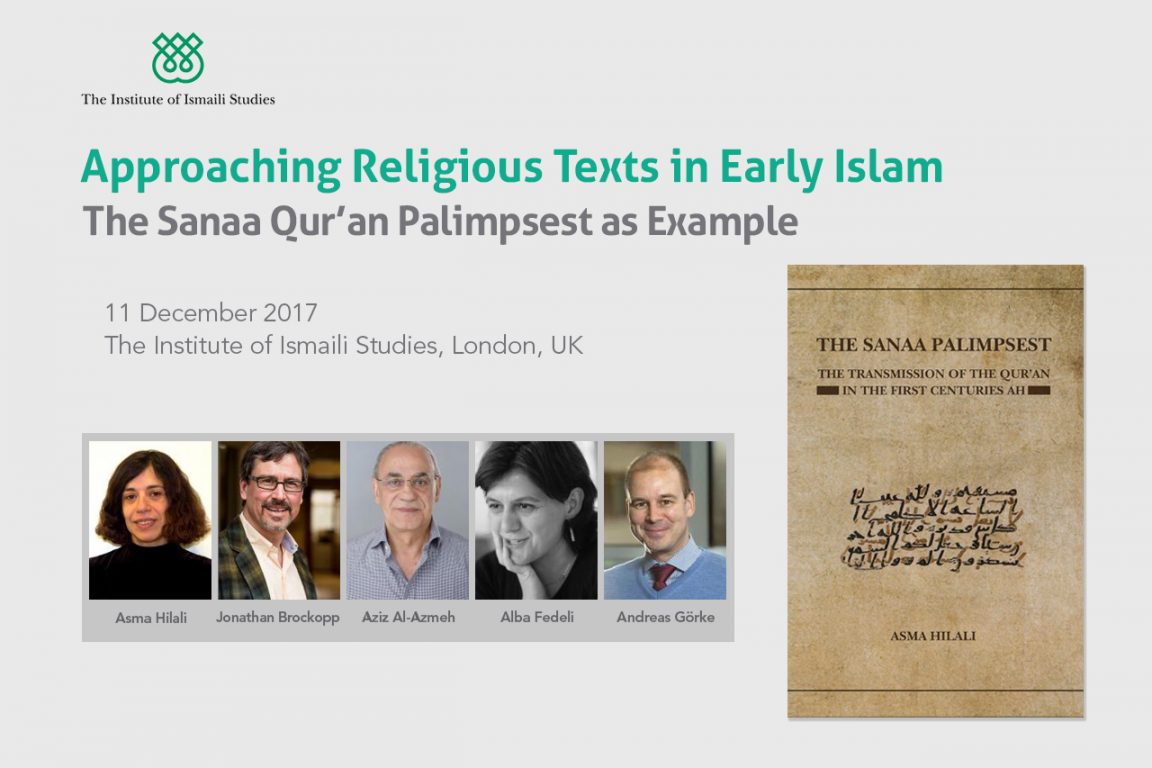Approaching Religious Texts in Early Islam: The Sanaa Qur’an Palimpsest as Example

About The Event
Date: December 11, 2017
Venue: The Institute of Ismaili Studies, 210 Euston Road, London, NW1 2DA, UK
The round table brings together five scholars of the Qur’an and early Islamic documents on the occasion of the publication of Asma Hilali’s The Sanaa Palimpsest: The Transmission of the Qur’an in the first centuries AH (Oxford University Press in association with the Institute of Ismaili Studies, 2017).
The book provides an introduction to and the edition of one of the oldest Qur’an manuscripts discovered so far: Manuscript 0127-1 from Dār al-Makhṭūṭāt in Sanaa, Yemen (called ‘the Sanaa palimpsest’ for ease of reference), a manuscript dating to the 1-2nd century AH/7th century CE. The palimpsest contains 38 leaves on which two superimposed Qur’anic texts are written: the lower text dated to the 7th century was subsequently erased and a second text of the Qur’an was written upon it around the 8th century. Both Qur’anic texts are fragmentary and present aspects of work in progress, such as incomplete decoration in the upper text and a reading instruction in the lower text.
The roundtable includes discussions on and critiques of a number of methodological issues raised by Hilali in her book, as well as the main results and hypothesis related to her interpretation of the palimpsest and the use of the palimpsest by its contemporaries.
The round table is divided into two parts: the morning sessions is dedicated to the text and its interpretation and the afternoon sessions focus on the transmission and use of religious texts in early Islam. All sessions include discussions and Q&A.
Specific samples of passages extracted from the Sanaa’ palimpsest will be displayed and discussed and, although the round table is dedicated to Hilali’s recent book, other examples of early texts such as hadith and early legal documents will be approached in order to highlight the implications of the study of the Sanaa’ palimpsest in a wider context related to approaching the Qur’an and other religious texts in early Islam.
Program
- I. The Sanaa Qur’an Palimpsest: The Manuscript and Its Study
– Accessing the Manuscript and Realizing the Book (Asma Hilali)
– The 2007 FrenchItalian Mission: Imaging the Sanaa Palimpsest (Alba Fedeli)
- II. Publishing The Sanaa Qur’an Palimpsest: Challenges and Outcomes
– Continuities and Ruptures (Asma Hilali)
– Technical Challenges and Publishing Choices (Russel Harris and Omar Ali-de-Unzaga)
- III. The Text and Its Interpretation
– Conceptual Framework in the Study of Early Copies of the Qur’an (Aziz al-Azmeh)
– Codicology/Palaeography in the Study of Palimpsests (Alba Fedeli)
– Interpreting Absence (Asma Hilali)
- IV. Which Text for Which Use? The Transmission of Texts in Early Islam
– Studying the Qur’an in Early Islam (Andreas Görke)
– When did the Qur’an become a book? (Jonathan Brockopp)
– Annotations and Marginalia in Early Qur’an Manuscript (Asma Hilali)
- General Discussion: Methodologies For Approaching Religious Texts in Early Islam.
– The use of manuscripts and other material by historians
– Digital editions/ critical editions
– Accessing unknown manuscripts
– Datation/dating and the historicization of the texts (with focus on the chronology of the Qur’an)
– The issue of “genre” in early Islam
- Concluding Remarks (Asma Hilali and Omar Ali-De-Unzaga)
Speakers
- Asma Hilali, research associate at the Institute of Ismaili Studies, London and an associate professor in Islamic Stuides at the University of Lille. She gained her PhD from l’École Pratique des Hautes Études, Paris. She has worked in various research centers in Germany, France and the United Kingdom.
- Jonathan Brockopp, associate professor of history and religious studies at the Pennsylvania State University. His primary research focus is on the literary remains of early Islamic cultures, including the Qur’an, hadith, legal and theological texts.
- Aziz Al-Azmeh, university professor emeritus and distinguished visiting professor of History at the Central European University, Budapest.
- Alba Fedeli, research fellow at FSCIRE in Bologna, Italy, and honorary research fellow of the Institute for Textual Scholarship and Electronic Editing at the University of Birmingham, working on the transmission of early Qur’anic manuscripts through phylogenetic analysis.
- Andreas Görke, lecturer in Islamic Studies at the University of Edinburgh. He has worked as lecturer and researcher at the Universities of Hamburg and Basel, the Social Science Research Center Berlin (WZB), Freie Universität Berlin, and the University of Kiel, and served as acting professor for early and classical Islam at the University of Hamburg.
Source: The Institute of Ismaili Studies
Location
The Institute of Ismaili Studie


We're always eager to hear from you.
If you’d like to learn more about us or have a general comments and suggestions about the site, email us at